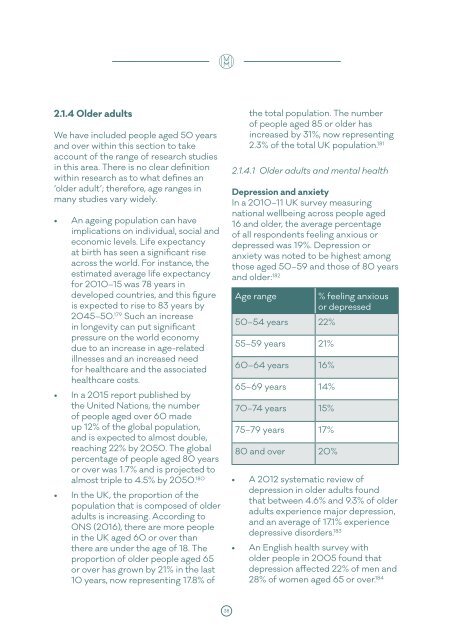FUNDAMENTAL FACTS ABOUT MENTAL HEALTH 2016
fundamental-facts-about-mental-health-2016
fundamental-facts-about-mental-health-2016
Create successful ePaper yourself
Turn your PDF publications into a flip-book with our unique Google optimized e-Paper software.
2.1.4 Older adults<br />
We have included people aged 50 years<br />
and over within this section to take<br />
account of the range of research studies<br />
in this area. There is no clear definition<br />
within research as to what defines an<br />
‘older adult’; therefore, age ranges in<br />
many studies vary widely.<br />
• An ageing population can have<br />
implications on individual, social and<br />
economic levels. Life expectancy<br />
at birth has seen a significant rise<br />
across the world. For instance, the<br />
estimated average life expectancy<br />
for 2010–15 was 78 years in<br />
developed countries, and this figure<br />
is expected to rise to 83 years by<br />
2045–50. 179 Such an increase<br />
in longevity can put significant<br />
pressure on the world economy<br />
due to an increase in age-related<br />
illnesses and an increased need<br />
for healthcare and the associated<br />
healthcare costs.<br />
• In a 2015 report published by<br />
the United Nations, the number<br />
of people aged over 60 made<br />
up 12% of the global population,<br />
and is expected to almost double,<br />
reaching 22% by 2050. The global<br />
percentage of people aged 80 years<br />
or over was 1.7% and is projected to<br />
almost triple to 4.5% by 2050. 180<br />
• In the UK, the proportion of the<br />
population that is composed of older<br />
adults is increasing. According to<br />
ONS (<strong>2016</strong>), there are more people<br />
in the UK aged 60 or over than<br />
there are under the age of 18. The<br />
proportion of older people aged 65<br />
or over has grown by 21% in the last<br />
10 years, now representing 17.8% of<br />
the total population. The number<br />
of people aged 85 or older has<br />
increased by 31%, now representing<br />
2.3% of the total UK population. 181<br />
2.1.4.1 Older adults and mental health<br />
Depression and anxiety<br />
In a 2010–11 UK survey measuring<br />
national wellbeing across people aged<br />
16 and older, the average percentage<br />
of all respondents feeling anxious or<br />
depressed was 19%. Depression or<br />
anxiety was noted to be highest among<br />
those aged 50–59 and those of 80 years<br />
and older: 182<br />
Age range<br />
50–54 years 22%<br />
55–59 years 21%<br />
60–64 years 16%<br />
65–69 years 14%<br />
70–74 years 15%<br />
75–79 years 17%<br />
80 and over 20%<br />
% feeling anxious<br />
or depressed<br />
• A 2012 systematic review of<br />
depression in older adults found<br />
that between 4.6% and 9.3% of older<br />
adults experience major depression,<br />
and an average of 17.1% experience<br />
depressive disorders. 183<br />
• An English health survey with<br />
older people in 2005 found that<br />
depression affected 22% of men and<br />
28% of women aged 65 or over. 184<br />
38


